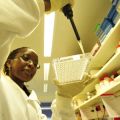
Learning machines turn to quantum
With each passing day it seems that the torrent of data generated by devices such as computers and smart phones grows ever greater.
If we humans are struggling to cope with this 'information overload' then spare a thought for the machines tasked with trying to improve web searches, understand the content of video and images, translate speech, and even analyse genomes.
Machine learning, where computers figure out 'for themselves' how to perform data analysis, modelling and inference, and optimisation, finding the best solution to a problem from a set of alternatives, can help us to manage our data-rich lives. But there's a problem:
'Machine learning and optimisation are important, but they are hard for conventional computers,' Simon Benjamin of Oxford University's Department of Materials tells me. 'The tasks don't scale well. Suppose that you can 'just about' handle some particular task, but then you instead try to handle a task that is twice as complex. Then it can be vastly more difficult for the computer, practically impossible, even if you bring in lots more computers to help.'
Now a new project starting this month called Quantum Optimisation and Machine Learning (QuOpaL), jointly supported by Oxford University, Nokia, and Lockheed Martin, is setting out to explore the potential for quantum technology to enhance optimisation and machine learning tasks.
'The hope is that by harnessing quantum effects, we can tackle things in a fundamentally different way and then the learning process will scale better – allowing us to get to the really tough tasks that reach far beyond human capabilities,' explains Simon, who is leading the Oxford side of the project with Steve Roberts of the Department of Computer Science.
From search engines such as Google to the speech recognition software powering Apple's Siri, machine learning and optimisation are already part of our everyday lives but they are also at work behind the scenes in service industries and manufacturing:
'Another example is predicting things, like anticipating the supply needs of a big supermarket chain based on analysing loads of sales data from previous months,' adds Simon. 'But the applications go even further including finding the 'best way' to solve problems. For example, Intel researchers were able to show that improved computer optimisation of the design of silicon chips can reduce power consumption by 38%. These, and many other applications, are potentially areas where quantum machine learning and optimisation can help.'
QuOpaL will examine a range of approaches being developed as part of research into quantum information processing – using effects in the quantum world to store and manipulate information. One of the most promising is adiabatic quantum optimisation (and the closely related phenomenon of quantum annealing). Here, a system is initialised to a simple state and then the conditions are slowly ('adiabatically') changed to reach a complex final state that describes the solution to a computational problem. Many believe that this approach is the best way to start using quantum effects for accelerated machine learning.
'The idea that harnessing quantum physics can help with hard computing tasks has been around for nearly thirty years, and has driven a worldwide race to develop the necessary hardware,' Simon tells me. 'The exciting news is that the hardware is nearly ready! What we can now do in Oxford and in other leading labs elsewhere in the world, is to make components that meet and exceed the necessary performance figures for a real working device. Now, we have to build it!
'For machine learning in particular there is also some important theory that needs to be worked out to fully understand the best way to exploit the quantum effects for the different kinds of application. It's very timely to be starting QuOpaL - the project is up and running and we're recruiting, looking at people from all sorts of backgrounds to join this interdisciplinary project. I'm very excited about it!'
Find out more about research and recruitment opportunities at QuOpaL.com
 Counting quantum cards
Counting quantum cards Where did the Moon come from?
Where did the Moon come from? Promising results in efforts to develop new malaria treatments
Promising results in efforts to develop new malaria treatments Land of the bacteria-eaters
Land of the bacteria-eaters Pan-tastic: cook with 40% less energy
Pan-tastic: cook with 40% less energy